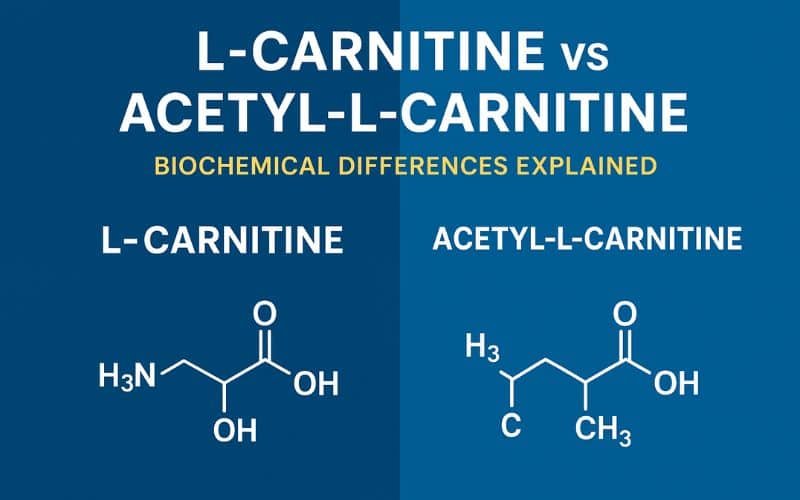No products in the cart.
Return To ShopL-Carnitine vs Acetyl-L-Carnitine: Biochemical Differences Explained
When it comes to supplements that boost energy and fat metabolism, carnitine often makes its way into the conversation. But here’s where confusion arises: should you take L-Carnitine or Acetyl-L-Carnitine (ALCAR)? While they sound similar, their biochemical roles and benefits are quite distinct. This article breaks down their differences in simple terms so you can choose wisely depending on whether your goal is muscle performance, fat loss, or cognitive support.

The Role of Carnitine in the Human Body
At its core, carnitine is a compound that shuttles long-chain fatty acids into mitochondria the energy factories of our cells. Once inside, these fats are burned for energy, fueling everything from basic metabolic functions to high-intensity workouts. Without enough carnitine, your body’s ability to efficiently use fat as fuel drops, leaving you more reliant on glucose.
Interestingly, supplements that promote fat burning, like those in the Fat Burners category, often work synergistically with carnitine, as they both target the body’s ability to convert stored fat into usable energy.
What is L-Carnitine?
L-Carnitine is the standard form most people think of when discussing carnitine. It’s naturally produced in the body from amino acids like lysine and methionine, and is also found in red meat and dairy.
Its main job is to facilitate fat metabolism in muscle tissue, making it a favorite among athletes and individuals on weight-loss programs. Supplementation is particularly useful for endurance athletes and those on calorie deficits who want to preserve energy.
One example is Applied Nutrition L-Carnitine, which supports fat oxidation and energy conversion during workouts.
What is Acetyl-L-Carnitine (ALCAR)?
Acetyl-L-Carnitine is an acetylated version of carnitine. This biochemical tweak allows it to cross the blood-brain barrier, making it not only useful for energy but also for brain health.
ALCAR is often chosen for its cognitive benefits: supporting memory, mental clarity, and focus. This makes it especially appealing to those who want both mental and physical performance enhancement. It’s frequently included in stacks alongside health & wellness supplements because of its broad role in metabolism and brain function.
Biochemical Differences Between L-Carnitine and Acetyl-L-Carnitine

Although they stem from the same base, their biochemical roles differ:
- Molecular Structure: ALCAR has an added acetyl group, enhancing its ability to cross into the brain.
- Primary Action: L-Carnitine supports muscle energy and fat oxidation, while ALCAR optimizes brain mitochondrial function.
- Focus of Use: L-Carnitine is preferred for physical performance; ALCAR is favored for mental clarity.
- Tissue Distribution: L-Carnitine accumulates more in muscles, ALCAR more in neural tissues.
Both forms support energy, but they target different parts of the body. Athletes aiming for lean muscle may choose L-Carnitine, while those needing cognitive enhancement often go for ALCAR.
Energy Metabolism: Who Does What?
In workouts, L-Carnitine helps delay fatigue by mobilizing fat stores, meaning you can exercise longer before glucose stores run out. In contrast, ALCAR shines in supporting brain energy metabolism, ensuring neurons function efficiently under stress or fatigue.
Pairing these with broader wellness aids like Omega 3 supplements can further enhance mitochondrial health and overall energy balance.
Fitness Benefits of L-Carnitine
For athletes and fitness enthusiasts, the advantages of L-Carnitine include:
- Enhanced fat oxidation, leading to improved fat loss.
- Greater endurance during cardio and resistance training.
- Faster recovery from exercise-induced fatigue.
Stacking it with supportive compounds like CLA creates a synergistic fat-burning and energy-support effect.
Cognitive and Neurological Benefits of ALCAR
Unlike L-Carnitine, ALCAR is widely studied for its brain benefits:
- Supports mental clarity and focus.
- Enhances memory and learning processes.
- Protects neurons by improving mitochondrial function.
It is particularly valuable for professionals balancing demanding work with training, and can be paired with multivitamins to support overall cognitive and physical wellness.
Supplementation: Choosing the Right Form
Both forms of carnitine have their place.
- Choose L-Carnitine if your goal is fat loss, muscle energy, or athletic performance.
- Choose ALCAR if you want sharper focus, mental energy, or are concerned about age-related cognitive decline.
Many athletes also stack carnitine with whey protein for complete muscle support, ensuring both energy and recovery are optimized.
Myths vs Scientific Reality
A common myth is that “all carnitines work the same way.” In truth, their biochemical differences determine whether they target muscle metabolism or brain function. Another misconception is that ALCAR is automatically superior in reality, it depends entirely on your goals.
When buying supplements, it’s also important to ensure authenticity. Guides like How to Identify Fake Imported Supplements highlight the risks of counterfeits and why sourcing from reliable distributors matters.
Safety, Dosage, and Best Practices
Both L-Carnitine and ALCAR are considered safe for most people when taken at recommended doses. Typical ranges are:
- L-Carnitine: 1–3g per day.
- ALCAR: 500–2000mg per day.
However, individuals with medical conditions or sensitivities should consult a healthcare professional first. If you need personalized guidance, reach out to the SportsOne team for expert advice.
Conclusion: Bridging Biochemistry and Everyday Use
While L-Carnitine and Acetyl-L-Carnitine share a common root, their biochemical differences make them unique. L-Carnitine drives muscle performance and fat metabolism, whereas ALCAR energizes the brain and supports cognitive clarity.
Choosing between them comes down to your primary goal: do you want to train harder and burn fat efficiently, or do you want sharper focus and brain energy? With the right choice and a holistic approach to fitness both can become valuable allies in your wellness journey.









Add comment
You must be logged in to post a comment.